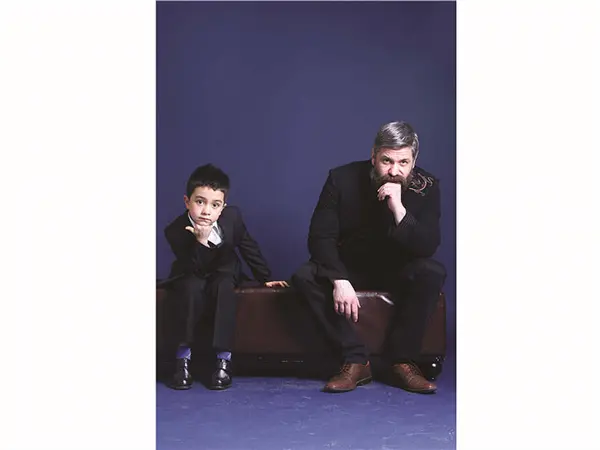(CHINA) German linguist Patrick Kuehnel says he is impressed with China's efforts in boosting cross-cultural links with the rest of the world.
German linguist Patrick Kuehnel was first drawn to China by its exoticism and language, he says.
As an exchange scholar sponsored by the German Academic Exchange Service, Kuehnel, 46, has been teaching linguistic and cultural communication at Beijing Foreign Studies University since 2010, and he was appointed as a guest professor by the university in 2013.
"Know how we make sense of the world and understand each other" is his mantra for cognition and languages.
"Learning a new language is like learning a new instrument. You open up new horizons to express yourself and you start having ideas that you never dreamed of," Kuehnel tells China Daily in a recent interview.
Fluent in several foreign languages, Kuehnel says he has also developed a "Chinese personality" that pops up whenever he speaks Chinese. For example, he likes to discuss various subjects, including linguistics in conversations with people, and above all, he enjoys theorizing. But when speaking to Chinese, he is more practical and humorous, he says.
"Some of my Chinese friends and even my wife were shocked when they learned about the topics I like to discuss with my non-Chinese friends. It is a bit like Dr Jekyll and Mr Hyde," he says, alluding to late Scottish author R.L. Stevenson's famous character with a dual personality.
Kuehnel says it was natural for him to look for languages that are highly expressive, sophisticated and exotic-all at once.
"You actually are becoming a different person by studying a different language," he says.
Starting with Arabic and Turkish as a schoolboy and a part of college, he became courageous enough later to try Chinese-considered completely out of reach for Europeans as a language, owing to its "strangeness", he says.
In 1997, when Kuehnel first visited China, the trip turned out to be more fruitful than he had expected.
He enrolled into a monthlong language program at a college in East China's Shan-dong province to learn basic Chinese while traveling. But he had to attend a higher-level class due to limited choices in lower levels.
While he lagged behind the class, he still tried to use whatever little he could pick up in exchanges with teachers and his classmates.
"I complained a lot, but I decided to hold on because I wanted to temper myself," Kuehnel recalls.
Soon he was surprised to find that his spoken Chinese improved fast. Encouraged by that, Kuehnel extended his stay in China.
The following year, he successfully passed a test for high-level Chinese, a rare feat for foreigners back then.
Kuehnel also chose Chinese as a subject of his thesis on linguistics after he returned to Germany in 1998.
During his time in Shan-dong, he met a Chinese woman, Gai Wenqing, whom he married in 2006. After several years in Germany, the couple returned to China in 2010 and have since lived in Beijing.
For Kuehnel, who easily gets bored of routine, China can be a good place to live, he says.
But it's more than just that for him.
He is following in the footsteps of many other foreigners who are coming to China for career development as the country's relevance in world affairs grows.
As an expert on cross-cultural communication, Kuehnel pays close attention to related issues and says he is impressed by Chinese efforts in cooperating with other countries in the field.
"Chinese don't regard themselves as laggards anymore, and instead of mimicking the West, they are taking a more confident approach," he says of cultural exchanges with foreigners.
But biases still exist in communication between China and Western countries, he says, recalling interesting incidents from his own life.
He often gets into arguments with his German friends while discussing China. While his friends criticize him for "favoring" China because he lives here, he tells them they are actually "biased" because they have never been or lived in China, and their perceptions largely depend on Western media.
"It's a pity that many Westerners have no idea about China's past and especially the life of its common people," Kuehnel says. "Without knowing that, you can't possibly understand the Chinese way of thinking."
Last year, Kuehnel was invited by Chinese government officials to give recommendations on issues concerning the country's development.
He suggested that China should reshape its international image by fostering creativity.
While he is mostly busy teaching, Kuehnel has managed to translate a number of books from German to Chinese and vice versa.
He has also played an important role in boosting a student exchange program between Beijing Foreign Studies University and his former university in Germany.
As tenure with the German Academic Exchange Service ends later in the year, Kuehnel says it is time for him to plan for the future.
"I will either stay in China or keep close ties with the country," he says, adding that he hopes to make greater contributions to Sino-German cultural and linguistic exchanges.
 简体中文
简体中文

